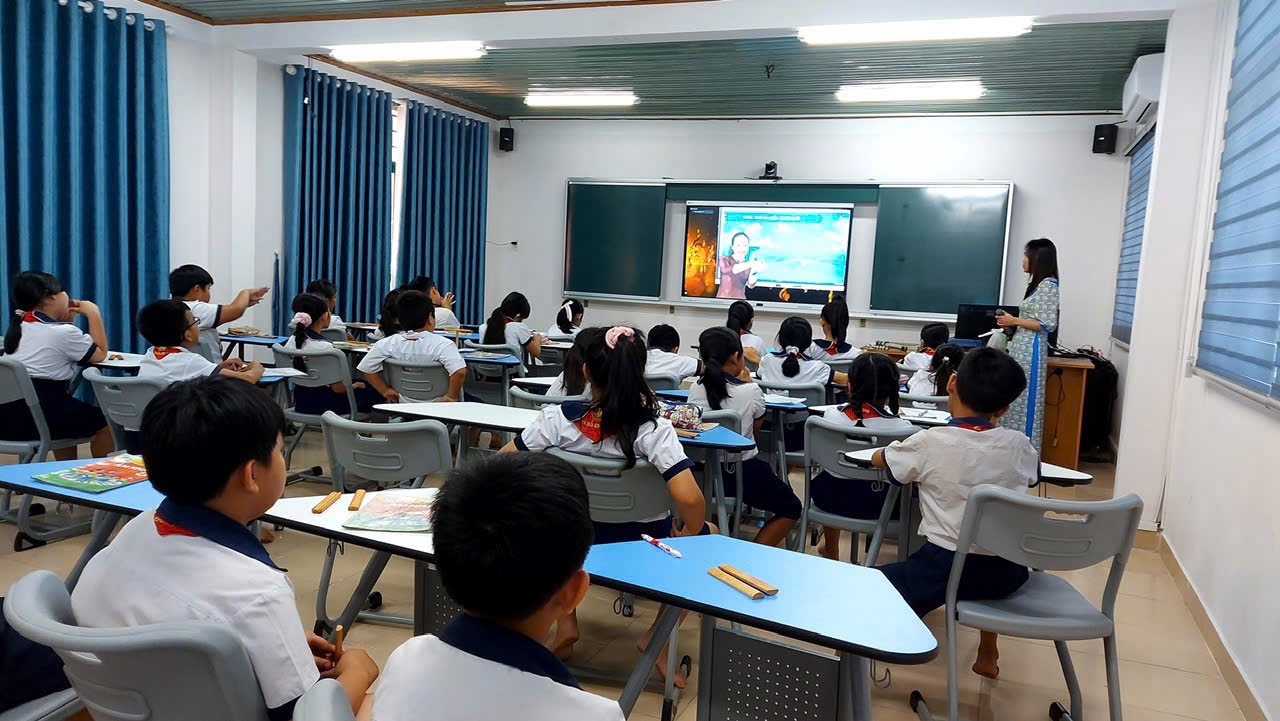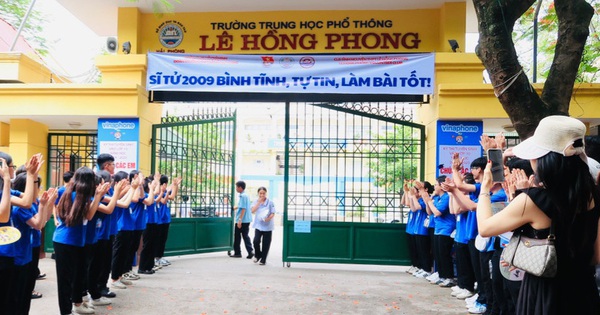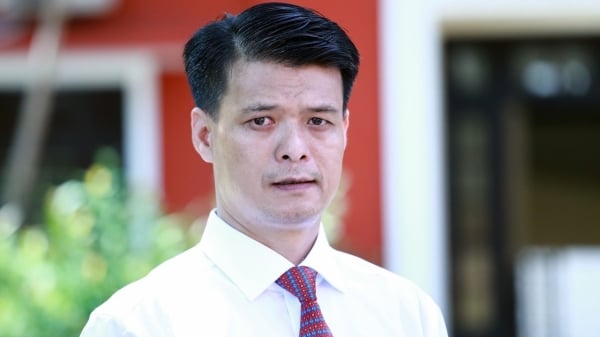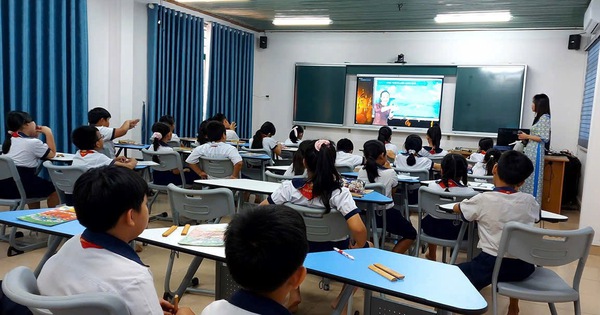Digital classes are organized by grade unit and according to a specially designed timetable because it depends on the teaching teacher's timetable.
After a year of piloting, Ho Chi Minh City's digital classroom model not only solves the shortage of teachers but also helps students in remote areas access new knowledge and technology.
According to the Ho Chi Minh City Department of Education and Training, from the second semester of the 2023-2024 school year, the digital classroom model has expanded to primary schools across the city with many other subjects at the primary level. Many students have participated in these lessons.
Students are excited and enthusiastic
From the 2022-2023 school year, the Ho Chi Minh City Department of Education and Training will begin piloting the implementation of a digital classroom model to address the shortage of subject teachers in the context of implementing the 2018 General Education Program.
In the first year of the pilot, digital classes were implemented with two subjects: English and IT at Thanh An Primary School (Can Gio district) and Trung Lap Thuong Primary School (Cu Chi district).
The decision to pilot digital classrooms stems from the fact that when implementing the 2018 General Education Program, Ho Chi Minh City encountered many difficulties due to a lack of local teachers, especially in English and IT. In districts far from the center of Ho Chi Minh City, it is even more difficult to recruit teachers to teach these two subjects. According to the leader of the Department of Education and Training, implementing digital classrooms is one of the solutions that Ho Chi Minh City has applied digital transformation in teaching and learning; bringing excitement and joy to students in the learning process.

Digital classroom deployed at Trung Lap Thuong Primary School (Cu Chi district, Ho Chi Minh City)
Explaining the selection of the above two pilot schools, according to the Department of Education and Training of Ho Chi Minh City, these are two primary schools that lack English and IT teachers, but have difficulty recruiting and transferring teachers from other places due to their remote locations. Another reason is that the ability to access new technology and methods is not high, and the introduction of digital transformation will effectively support professional training as well as improve the quality of education at the school.
Mr. Nguyen Bao Quoc, Deputy Director of the Department of Education and Training of Ho Chi Minh City, said that to organize digital classes at the two schools above, the teachers in charge of the classes are teachers selected, trained and coached by the department. In addition, teachers must meet good professional requirements, have good teaching skills in the digital environment, master the classroom, and apply many dynamic methods to help students be interested in participating in the lesson. Digital classes are organized by class unit and according to a specially designed schedule because it depends on the schedule of the teaching teacher. Digital classes at the two units must have a teaching assistant teacher directly monitoring the students.
Over the implementation period, Mr. Nguyen Van Toi, Principal of Trung Lap Thuong Primary School, commented that the digital classroom initially effectively solved the shortage of subject teachers. The digital classroom also helped the school's teachers to enhance innovation in methods and apply information technology in teaching. Students were very interested in the new learning model, so they actively studied, were confident in working in groups and communicating with teachers in English. Many teachers have applied technology to design lessons with many attractive games, attracting students to participate.
Expand to multiple locations
According to the Department of Education and Training of Ho Chi Minh City, from the second semester of the 2023-2024 school year, the digital classroom model will not only expand to primary schools across the city but also to students from Muong Khuong and Simacai districts, Lao Cai province.
The digital classroom model has solved the problem of the shortage of teachers in music, fine arts, foreign languages, and information technology at schools in the above areas. Specifically, for the digital classroom implemented with the support of the Ho Chi Minh City Digital Transformation Support Center, teachers teach at the studio, connecting online with Thanh An Primary School, Trung Lap Thuong Primary School and a school in Lao Cai province. With the digital classroom implemented in the form of 1-1, teachers from a school in Ho Chi Minh City teach via computer with online connection to support a school in another locality.
Currently, 6 schools in Ho Chi Minh City have participated in this model and 8 primary schools in Ba Ria - Vung Tau, Lao Cai and Dien Bien provinces have been supported.
In the 2024-2025 school year, the Ho Chi Minh City Department of Education and Training continues to support the implementation of English classes for a number of primary schools in Lao Cai, Dien Bien and Con Dao districts, Ba Ria - Vung Tau province. 47 teachers from 8 primary schools participated, conducting 271 lessons to support the schools.
At the conference to review 1 year of piloting the digital classroom model, a representative of Phi Nhu Primary Boarding School (Dien Bien Dong District, Dien Bien Province) said that in the 2024-2025 school year, the district has 15 English teachers, compared to the need of 19 teachers. Phi Nhu Primary Boarding School implements compulsory English for 11 classes, 324 students (from grade 3 to grade 5) with a total of 44 periods/week. The school has only 1 English teacher but is on maternity leave.
With the support of the education sector
In Ho Chi Minh City, the school has organized English teaching hours through digital classrooms. The Department of Education and Training of Dien Bien Dong district has invested in an online classroom and equipped the classrooms with projectors, screens, and audio-visual equipment, ensuring the minimum requirements for the school to implement teaching and learning.
From May 2024, under the direction of the Department of Education and Training of Ho Chi Minh City, the Principal of Tan Son Nhi Primary School (Tan Phu District) assigned the school's English teachers to connect to the online classroom of Phi Nhu Primary Boarding School for Ethnic Minorities to conduct a trial teaching session. The two schools agreed to assign the task to the English teachers of Tan Son Nhi Primary School to develop a plan to support online teaching for students of Phi Nhu Primary Boarding School for Ethnic Minorities from the first semester of the 2024-2025 school year.
Every week, before the English class, teachers at Tan Son Nhi Primary School send the class link and the content to prepare for the lesson. Then, homeroom teachers of each class support and help ethnic minority students living more than 2,000 km away...
Build lessons with good teachers
According to Mr. Nguyen Bao Quoc, in the coming time, the Department of Education and Training of Ho Chi Minh City will continue to guide schools to coordinate with professional departments and the city's Digital Transformation Support Center to build teaching sessions with a team of good teachers, quality content, and use advanced technology to make students interested in digital classes.
The Ho Chi Minh City Department of Education and Training will also conduct many evaluations, provide feedback, and draw lessons on organization, management, teaching expertise, and support platforms. The Department is also making efforts to make digital classrooms not only support primary school students in disadvantaged areas in Ho Chi Minh City and remote provinces, but also support primary schools in localities across the city that are lacking IT, art, music, and English teachers.
Source: https://nld.com.vn/vuon-xa-mo-hinh-lop-hoc-so-196250202200929028.htm




















































Comment (0)